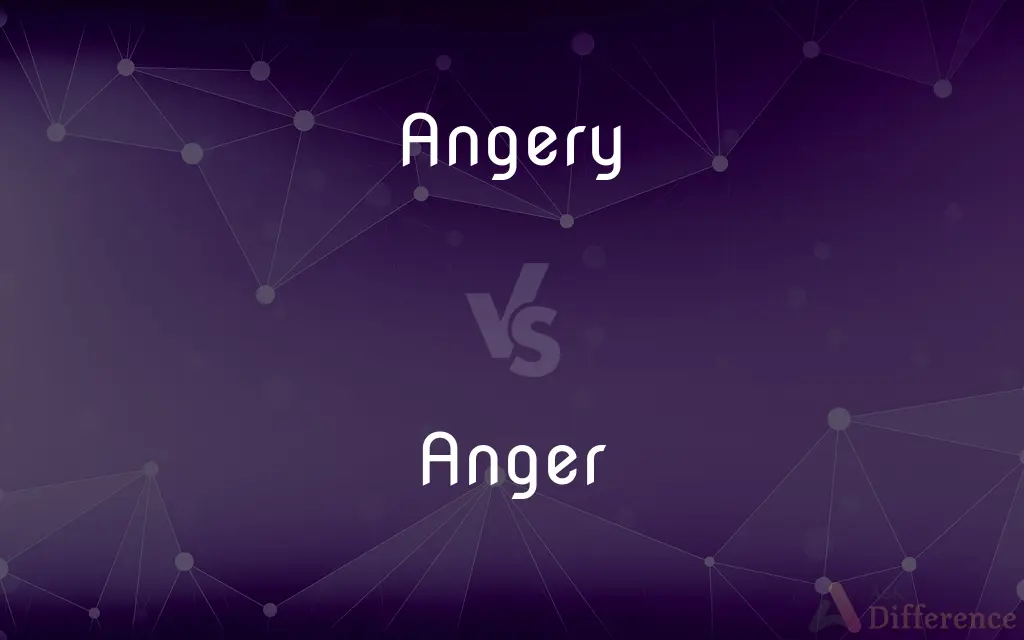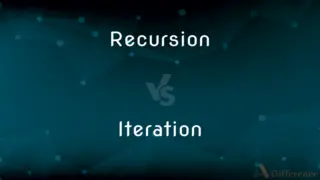Angery vs. Anger — What's the Difference?
By Tayyaba Rehman & Maham Liaqat — Published on July 9, 2024
"Angery" is an intentional misspelling of "anger" used in internet slang to express exaggerated frustration, while "anger" is a standard English word referring to a strong feeling of annoyance or displeasure.

Difference Between Angery and Anger
Table of Contents
ADVERTISEMENT
Key Differences
Anger is a basic human emotion characterized by antagonism toward someone or something you feel has deliberately wronged you. It can vary from mild irritation to intense rage. On the other hand, "angery" is a humorous or ironic misspelling of anger, often used online to depict a mock-serious or overly dramatic reaction, typically accompanied by memes or exaggerated expressions.
While anger can lead to constructive outcomes when managed properly, such as solving problems or standing up for oneself, "angery" serves as a form of online communication that lightens the mood. It's used to exaggerate feelings in a way that's not meant to be taken entirely seriously, whereas anger itself can have significant real-world consequences on relationships and decision-making.
Anger is considered a natural response to perceived threats and can trigger a wide range of physiological and psychological responses. This emotion can mobilize psychological resources for action. However, "angery" is primarily a social media phenomenon with no implications for one's physiological state. It's a playful way to acknowledge anger without the intent of inciting a genuine, aggressive response.
The expression of anger can be found across various cultures and contexts, and it has been a subject of study in psychology, sociology, and even in physiological research. "Angery," however, is a product of internet culture, reflecting the evolution of language and communication in digital spaces. It showcases how emotions are expressed and exaggerated for effect in online interactions.
In therapeutic or clinical settings, anger is a significant focus of study and intervention, as it can impact mental and physical health. Techniques such as anger management are employed to help individuals cope with anger. In contrast, "angery" requires no intervention; it's a self-aware, often humorous acknowledgment of anger that's part of the lexicon of internet culture, serving more as a tool for entertainment than a genuine emotional or psychological issue.
ADVERTISEMENT
Comparison Chart
Definition
A strong feeling of annoyance, displeasure, or hostility.
A humorous misspelling of "anger" used in internet slang.
Context
Emotional response to perceived wrongs, can occur anywhere.
Mainly used in online conversations or social media.
Psychological Impact
Can lead to stress, health issues if not managed properly.
Lacks a genuine psychological impact; used for humor.
Expression
Can be expressed through physical or verbal actions.
Expressed through text, often accompanied by memes.
Purpose
Signals a perceived threat, can motivate problem-solving.
To exaggerate or mock feelings of anger in a playful manner.
Compare with Definitions
Angery
Exaggeration of Anger
He posted, I am so angery after losing a video game, jokingly.
Anger
Human Emotion
She felt a surge of anger when she saw the unfair treatment.
Angery
Cultural Phenomenon
The use of angery reflects the playful nature of internet language evolution.
Anger
Motive for Action
His anger over the injustice motivated him to speak out.
Angery
Internet Slang
The dog's picture was captioned I am angery to show mock frustration.
Anger
Subject of Study
Psychologists study anger to understand its impact on human behavior.
Angery
Digital Communication
Angery reactions are popular in online forums for comedic effect.
Anger
Physiological Response
Anger can cause an increase in heart rate and blood pressure.
Angery
Humorous Misspelling
Angery memes often feature animals with exaggerated frowns.
Anger
Expressed Verbally or Physically
He expressed his anger through a strongly worded letter.
Angery
(Internet slang) angry
Anger
A strong feeling of displeasure or hostility.
Anger
To make angry; enrage or provoke.
Anger
A strong feeling of displeasure, hostility or antagonism towards someone or something, usually combined with an urge to harm, often stemming from perceived provocation, hurt, or threat.
You need to control your anger.
Anger
A strong passion or emotion of displeasure or antagonism, excited by a real or supposed injury or insult to one's self or others, or by the intent to do such injury.
Anger is likeA full hot horse, who being allowed his way,Self-mettle tires him.
Anger
A strong emotion; a feeling that is oriented toward some real or supposed grievance
Anger
The state of being angry
Anger
Become angry;
He angers easily
Common Curiosities
What causes anger?
Anger is caused by feelings of frustration, hurt, annoyance, or disappointment.
Does everyone experience anger?
Yes, anger is a universal emotion experienced by people across different cultures.
Why do people use "angery" instead of "anger"?
"Angery" adds a humorous or ironic tone, signaling that the anger is not to be taken too seriously.
What are some ways to manage anger?
Techniques include deep breathing, physical activity, and seeking professional help if needed.
Can "angery" be considered a meme?
Yes, "angery" often appears in memes to humorously depict frustration or mild anger.
Is "angery" a real word?
"Angery" is not recognized in standard English dictionaries; it's slang from internet culture.
Can anger be positive?
Yes, when managed properly, anger can motivate positive change or problem-solving.
How is "angery" used online?
"Angery" is used to convey mock anger, often in a humorous or exaggerated manner.
Is anger always harmful?
Not necessarily; anger can be constructive if expressed healthily and used to address issues.
Is it okay to express anger?
Yes, expressing anger in a healthy way is important for emotional health.
What is the role of "angery" in online communication?
It serves to lighten conversations, adding humor to expressions of frustration.
Can anger affect relationships?
Yes, unchecked anger can harm relationships, emphasizing the need for healthy expression.
How does society view anger?
Societal views on anger vary, but it is often considered negative unless expressed constructively.
How do psychologists view "angery"?
Psychologists might see "angery" as part of the broader phenomenon of internet culture influencing language and emotion expression.
Are there cultural differences in expressing "angery"?
While "angery" is mainly an internet phenomenon, cultural nuances in humor may affect its use.
Share Your Discovery

Previous Comparison
Probate Value vs. Market Value
Next Comparison
Recursion vs. IterationAuthor Spotlight
Written by
Tayyaba RehmanTayyaba Rehman is a distinguished writer, currently serving as a primary contributor to askdifference.com. As a researcher in semantics and etymology, Tayyaba's passion for the complexity of languages and their distinctions has found a perfect home on the platform. Tayyaba delves into the intricacies of language, distinguishing between commonly confused words and phrases, thereby providing clarity for readers worldwide.
Co-written by
Maham Liaqat












































